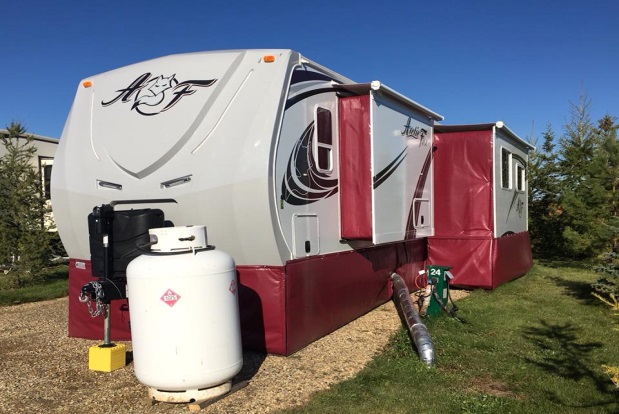Winter camping with us is easy! Here are some basic guidelines that we recommend.
Skirting
When you skirt your RV you are preventing any wind from blowing under your trailer and allowing that cold draft to get in. You can get it professionally done or if you want more of a do it yourself method, you can use bubble foil or even opt for some wood skirting and cut it down to customize it to your needs.
Always make sure you have your slides and windows insulated and you can easily do that with bubble foil or by purchasing a Window Insulator Kit from 3M. Another thing you want to look out for is your roof vents and skylights. Since heat rises this is a good place for it to escape and that can be avoided by either purchasing RV vent cushions or making your own out of thick foam padding. The best way to hold everything in place would be foil tape or tuck tape as it won’t move around in the colder months.
Sewer + Water
During the winter months at Rendez- Vous, we heat trace the water lines from the ground to the pedestal to prevent them from freezing. Our sewer lines are also deep enough in the ground that frost does not become a problem. However, if you are planning on having your water hooked up during
The winter, we recommend purchasing a heated water line (available at our office) as having a regular hose will freeze
As far as your sewer goes, having a rigid PCV pipe with bubble foil for insulation will ensure it does not freeze as it gets colder.
If you are unsure of using your water in the winter, we do have a clean shower house and laundry facilities that are open 24/7.
Condensation
Having high condensation in a camper in winter can be high these are some ideas is to have a dehumidifier in the camper or keep a vent open when you are cooking. Use water very little. We do have heated showers and coin laundry that is open 24/7days a week.
Propane + Power
Having a 450lb propane tank is a convenient and affordable way to keep your RV warm in the winter. We are able to fill them up on site at our propane station, bring them to your site with the bobcat and hook them up for you. We recommend keeping your propane tank above 30% as well.
Interior Insulation
Fill in all the opening and cracks in the floor with insulation, where the cold comes in. You can use Ploycel, Monofoam or even bubble wrap. It would benefit to get heavier drapes for windows and doors as these areas bring in the cold.
Exterior Insulation
Check window and seals and re-caulk where needed. Examine weather stripping. Adding a skirting to the bottom of your RV helps keep the floor warm. There are a few companies around Peace River that can custom skirting around your RV. You can also use many types of materials such as metal sheets, foam board or wood.
Stabilizing Jacks
Stabilizing Jacks can it is best to place blocks or wood beneath them. This way, you can raise the jacks, drive forwards, and then free the blocks with ice melt, a hammer and a chisel.
Covering your windows.
We thought this was a neat idea to share but heavy blankets would work as well as the doors and windows are the coldest areas in the camper.
Insulate Your RV Windows
here’s the few simple materials you’ll need to make this mod:
- pillow case (preferably one that matches your RV’s interior)
- roll of Reflectix
- standard sized pillow
- piece of cardboard as large as the pillowcase
- a few Velcro strips
What to do:
- What you’ll need to do is place a layer of the Reflectixon top of a pillow with the cardboard acting as backing.
- Insert the ‘sandwich’ of materials into the pillow case, and then use Velcro strips to keep your new insulating panel in place over the window.
- You might want to add another layer of cardboard to the front of the sandwich for added rigidity.
The purpose of the pillow is to create an additional air gap behind the Reflectix. When you insulate by using a radiant barrier like Reflectix, you want as large of an air gap as possible.
General Emergency Items to have on hand in winter
We figure this may help at other locations or even staying here with us.
- Tire chains
- Radio
- Extra blankets
- Warm Cloths
- Sleeping bags
- Drinking water
- Camping stove
- Gasoline-powered generator
- Extra propane tank
- Blow dryer to defrost pipes and tanks
- Extra Food
- Electric heater
We also strongly recommend having a carbon monoxide and fire alarm in your camper.

